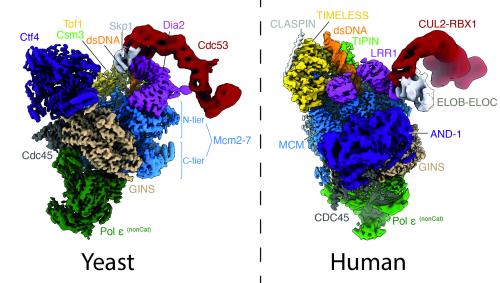
A collaborative study published in Nature from Tom Deegan (formerly a postdoc in Karim Labib’s lab, now a group leader at MRC HGU, Edinburgh) and Joe Yeeles’ lab (MRC LMB, Cambridge), has defined a new protective mechanism that cells use to prevent the premature termination of chromosome replication.
Every time a cell divides, it must accurately make a new copy of every one of it’s 46 chromosomes, so that this genetic blueprint can be passed on between cells and between generations. This process of chromosome replication, which frequently goes wrong in human diseases such as cancer, is carried out by a molecular machine called the replisome. The replisome is assembled on chromosomes at the start of replication, and is only disassembled once chromosome replication has finished. Disassembly is triggered by ubiquitylation of the replisome; the regulatory mechanism that restricts ubiquitylation to only those replisomes that have finished replication has been a major unanswered question for the past decade.
The team, made up of Tom, Joe, Michael Jenkyn-Bedford and Morgan Jones (both in Joe’s lab), used cryo-electron microscopy to solve structures of the replisome in complex with the E3 ubiquitin ligase that drives replisome ubiquitylation. These structures identified a previously undescribed replisome-E3 ligase interaction that is blocked by a DNA structure called the ‘excluded strand’, which is present at active replisomes, but disappears when replication has finished. Strikingly, despite using completely different E3 ubiquitin ligases for replisome ubiquitylation, this regulatory mechanism is conserved between yeast and humans. In addition to defining the molecular mechanism of a fundamental step in chromosome replication, this work may also have implications for our understanding of the origins of cancer and some developmental disorders, which are frequently associated with replisome disfunction and errors in the chromosome replication process.

